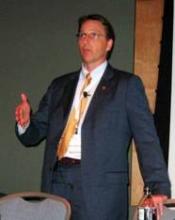Average hemoglobin A1c levels among the mentored patients fell significantly more after 6 months compared with a control group of patients. Among the patients who received mentorship, average A1c levels dropped from 6.34% at baseline to 6.13% at 6-10 months after the end of the mentoring program. Their average level of disease-related distress fell from a score of 4.08 at baseline to 3.40 6 months after the end of mentoring. The percentage of patients with a disease-related distress score greater than 6 – a marker of clinically significant distress – fell from 24% at baseline to 18% after 6 months. Both changes were statistically significant.
Even before peer mentoring started, WellMed outperformed most other health providers, according to an assessment of their methods and outcomes led by Dr. Robert L. Phillips, Jr., vice president for research and policy at the American Board of Family Medicine in Lexington, Ky.
In a case study led by Dr. Phillips, WellMed members in 2008 had an 18% rate of emergency department visits, a 14% hospitalization rate, a 14% rate of 30-day rehospitalizations, and a rate of 1,002 hospital bed days per 1,000 program members. In contrast, the Texas region’s Medicare program in 2006 had a 28% rate of ED visits, a 22% hospitalization rate, a 20% rate of 30-day rehospitalizations, and 2,559 hospital bed days per 1,000 program members. Those numbers were seen in a study that matched enrollees by age, gender, and number of chronic conditions. Dr. Phillips published a full report of his case study findings last year (J. Ambul. Care Manage. 2001;34:67-77).
"WellMed is really interesting because it does not include a hospital, and it’s primary care driven," Dr. Pace said. "The biggest issue [in creating a health care company like WellMed] is the way the health care dollars flow, and getting rid of the ‘silo-ing’ of dollars. The vision now is that hospitals and specialists are revenue centers that drive everything else; that’s how we think of health care."
WellMed "is an interesting model because it’s different from a hospital-led Accountable Care Organization. That gets you away from hospitals arguing about their bed days. Hospitals need to right-size. We think we can maintain this crazy misdistribution of specialists and hospitals, and it just can’t happen."
Dr. Pace and Dr. Phillips said that they had no disclosures.


